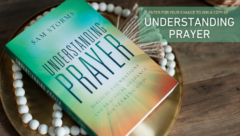I have been building an ongoing relationship with a person who adheres to a very different religion than my own. He is as committed to his faith as I am to mine and is as eager to speak to me as I am to him. It makes for some engaging and enjoyable conversation. I recently asked him what hope he has beyond the grave, what certainty he can have about life after death. “As you venture off into what comes beyond what we see and know, what confidence do you have of a warm welcome?”
His answer was that he has very little confidence. He is doing his best to live by the tenets of his faith, to be a good and moral and upright person. He worships when he is meant to worship, prays when he is meant to pray, and gives when he is meant to give. He is aware that he sometimes falls short, but responds to his transgressions and shortcomings by redoubling his efforts. He is all-in and doing all he can. But while he seems to be doing everything right, he still has no confidence when it comes to whatever happens after death. Why?
The answer does not lie in his own efforts or in the clarity of the instructions given in his scriptures. Rather, the answer lies in the character of the god he worships. His god, though said to be very powerful, is not known to be patient or kind. Though said to demand the highest of moral standards, he is not known to be completely consistent in his judgments. He can be harsh, he can be arbitrary, he can vary his standards. Though he is the being who created humanity, he does not reveal himself as compassionate toward them. And for those reasons his followers live their lives relating to a god who shows little love, little tenderness, little compassion. They are always uncertain about his posture toward them, always guessing at the nature of his relationship toward them. And them, at the end, they head toward death uncertain about whether they will go to eternal life or eternal death, to glory or judgment.
As I walked away from our most recent conversation, I found myself reflecting on the sheer wonder of compassion. Aren’t you thankful that our God is compassionate toward us? Aren’t you thankful that God promises he is close to the brokenhearted and that he saves those who are crushed in spirit? Aren’t you thankful that he promises he will not break a bruised reed and that he will not snuff out a smoldering wick? Aren’t you thankful that just as a father shows compassion to his children, so the LORD shows compassion to those who fear him? It is this fatherly heart of God that is especially relatable and therefore especially precious.
When Abby went off to college I wanted to assure her that I would continue to care about her and care for her. I told her what I will also tell her sister when she heads off this fall: “You only ever need to say ‘Daddy, I need you,’ and I will be on my way. By the time you finish your sentence you’ll hear the front door slam and the car engine start and the tires screech. I’ll be on my way to you.” Because that’s what it is to be a father—to respond to our children when they cry out for us. Surely no good father would hear his daughter cry out in hunger and give her a rock or hear his son cry out in anguish and hand him a snake. Surely no concerned father would hear his child cry for help and turn his back. And the best of human fathers, of course, is but the palest imitation of our heavenly Father.
Our God draws very close to us in our sorrows—the sorrow of pain, the sorrow of loss, the sorrow of betrayal, the sorrow of loneliness, the sorrow of facing our own sinfulness and fallibility. And, of course, the sorrow of facing our own mortality. Our God is most present just when he is most needed—ever ready and ever eager to offer his sweet comfort. His compassion—his wondrous fatherly compassion—draws him near to us when we so desperately need his help.










